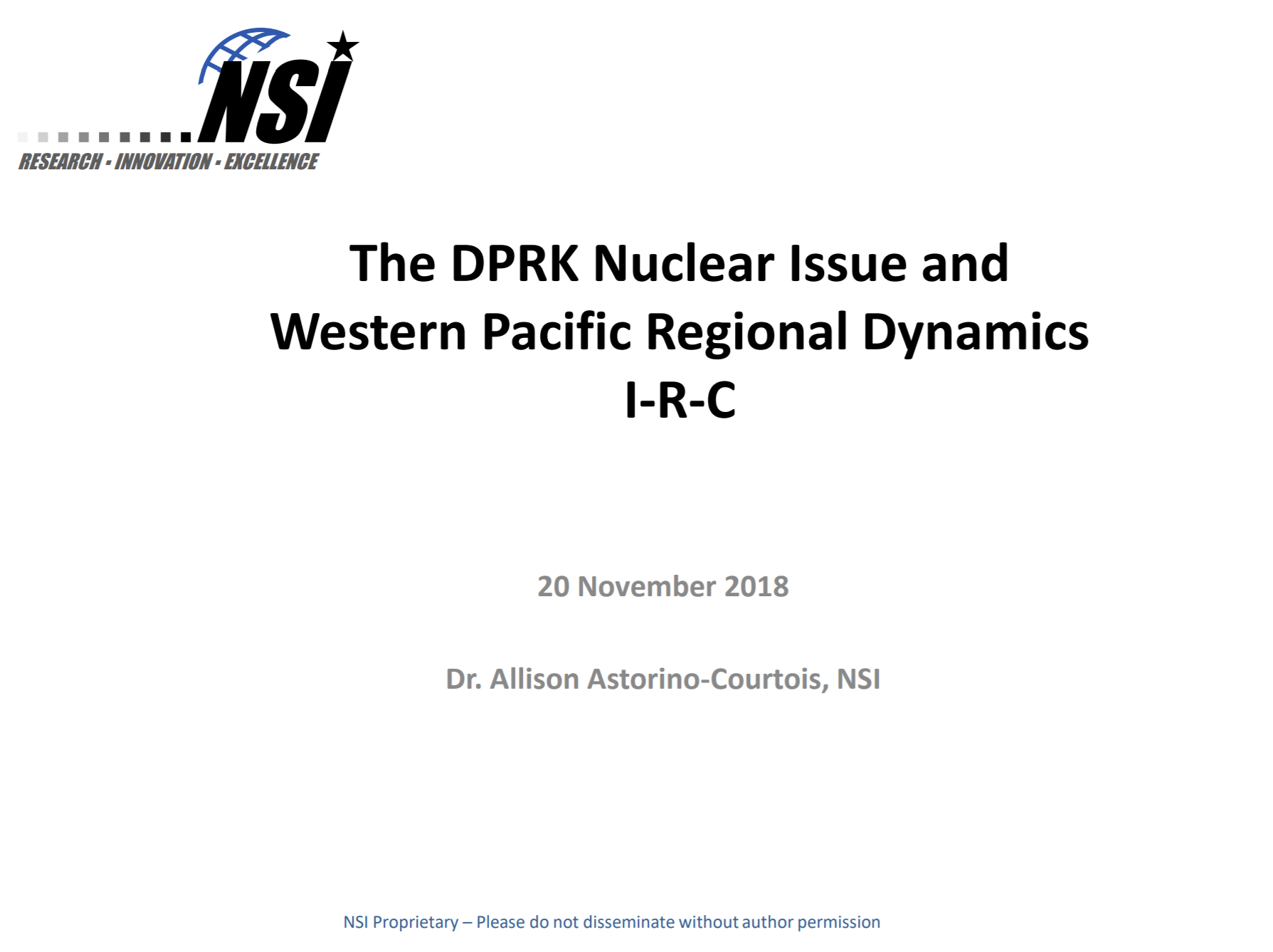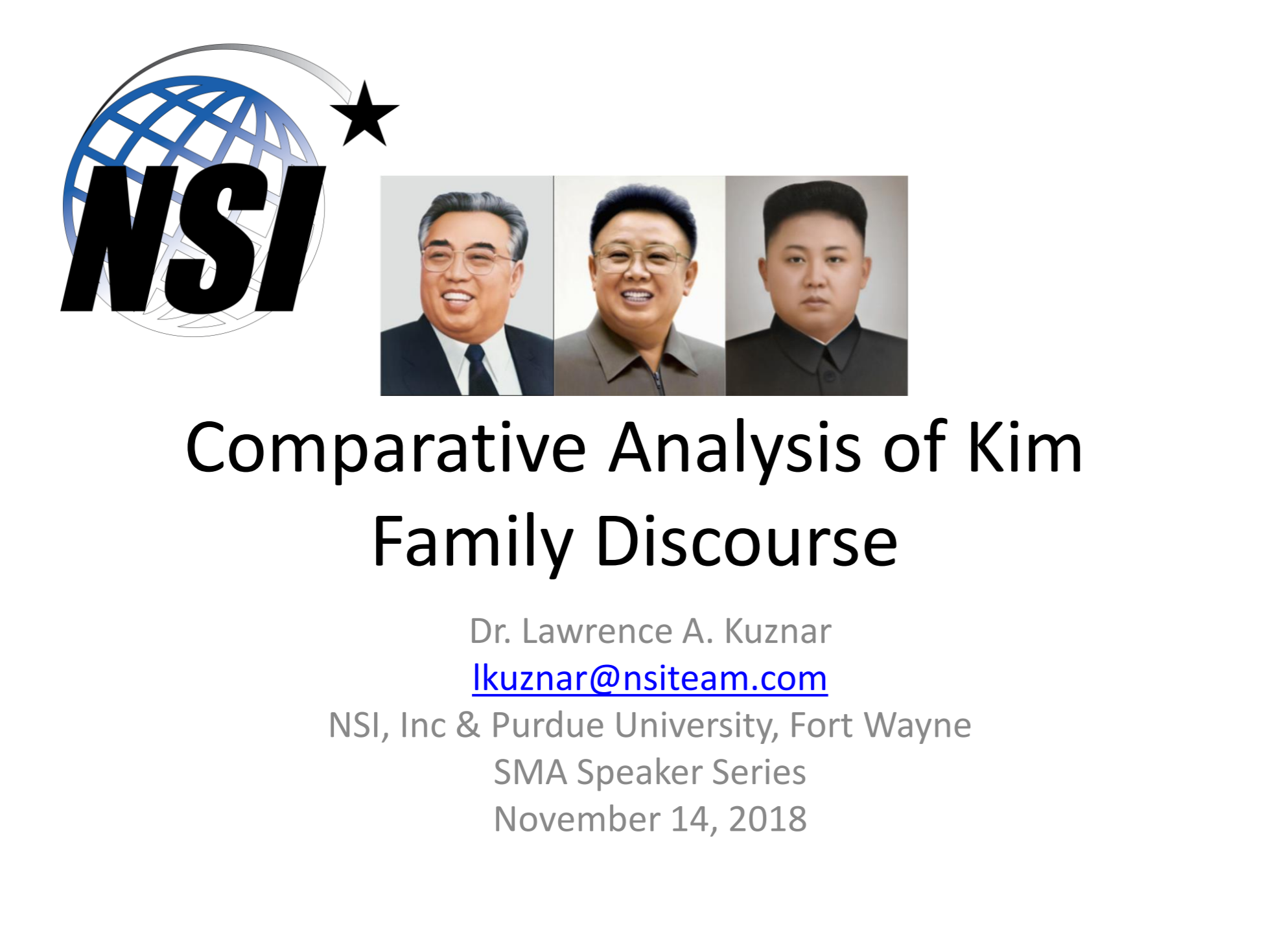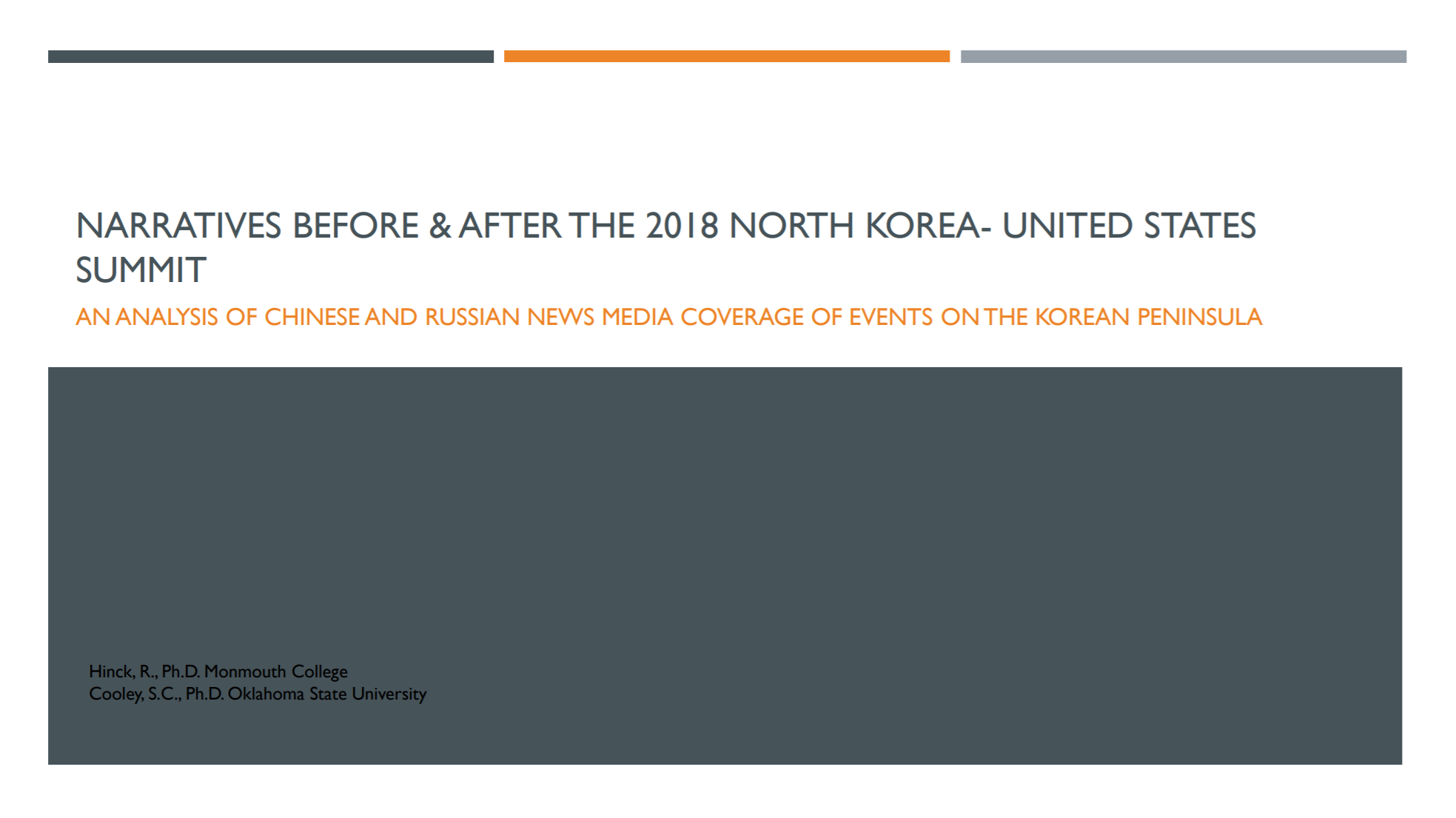Strategic Outcomes on the Korean Peninsula: Effort Results and Primary Findings
“SMA Korea Strategic Outcomes Effort- Results and Primary Findings Panel Discussion”
SMA hosted a panel discussion with Dr. Allison Astorino-Courtois (NSI, Inc.), Dr. Stephen Blank (American Foreign Policy Council), Dr. Robert Hinck (Monmouth College), Dr. Larry Kuznar (NSI, Inc. / Purdue University- Fort Wayne), and Anthony Rinna (Sino-NK) as part of its SMA Korea Strategic Outcomes Speaker Series. For additional speaker sessions and project publications, please visit the Korea Strategic Outcomes project page.
Date: 20 November 2018
Speaker Session Preview
To begin the presentation, Dr. Astorino-Courtois explained the methodology behind NSI’s Interest-Resolve-Capability (IRC) analysis, outlined the results and primary findings, and highlighted the regional dynamics that emerged during the analysis. Dr. Kuznar then explained the methodology behind NSI’s discourse analysis, discussed the composition and divisions of the corpora, and identified interesting patterns that emerged when comparing the discourse of Kim Il-sung, Kim Jong-il, and Kim Jong-un. Next, Dr. Hinck discussed the insights, implications, and major findings derived from his team’s analysis of Chinese and Russian news media coverage of events on the Korean Peninsula before and after the 2018 North Korea-US Summit. Dr. Blank proceeded to explain Russia’s primary objectives on the Korean Peninsula and highlighted its desires to be recognized as a great global power, to preserve its positive relationship with North Korea, to be involved in the negotiation process, and to maintain the status quo. To conclude, Mr. Rinna discussed China’s cultivation of a strong relationship with North Korea in order to maintain regional stability, as well as its desire to portray itself as a responsible great power and its perception of the North Korean nuclear issue as a non-urgent stability issue rather than an urgent security threat.
This panel supported SMA’s Korea Strategic Outcomes project. For additional speaker sessions and project publications, please visit the Korea Strategic Outcomes project page.
Speaker Session Recording
Briefing Materials
Biographies
Dr. Allison Astorino-Courtois is Executive Vice President at NSI, Inc. She has also served as co-chair of a National Academy of Sciences study on Strategic Deterrence Military Capabilities in the 21st Century, and as a primary author on a study of the Defense and Protection of US Space Assets. Dr. Astorino-Courtois has served as technical lead on a variety of rapid turn-around, Joint Staff-directed Strategic Multi-layer Assessment (SMA) projects in support of US forces and Combatant Commands. These include assessments of key drivers of political, economic and social instability and areas of resilience in South Asia; development of an analytic approach used to identify PACOM requirements for humanitarian support in a Megacity (case study: Dhaka, Bangladesh); development of a methodology for conducting provincial assessments for the ISAF Joint Command; production of a “rich contextual understanding” (RCU) to supplement intelligence reporting for the ISAF J2 and Commander; projects for USSTRATCOM on deterrence assessment methods; and, work for USSOCOM on operationalizing its “gray zone” concept.
Previously, Dr. Astorino-Courtois was a Senior Analyst at SAIC (2004-2007) where she served as a STRATCOM liaison to U.S. and international academic and business communities. Prior to that Dr. Astorino-Courtois was a tenured Associate Professor of International Relations at Texas A&M University in College Station, TX (1994-2003) where her research focused on the cognitive aspects of political decision making and how to “market” peaceful conflict resolution to adversarial actors. She has received a number of academic grants and awards and has published articles in multiple peer-reviewed journals. She has also taught at Creighton University and as a visiting instructor at the U.S. Military Academy at West Point. Dr. Astorino-Courtois earned her Ph.D. in International Relations and MA in and Research Methods from New York University. Her BA is in political science from Boston College. Finally, Dr. Astorino-Courtois also has the distinction of having been awarded both a US Navy Meritorious Service Award and a US Army Commander’s Award
Dr. Stephen Blank (American Foreign Policy Council) is an internationally known expert on Russia and the former Soviet Union, who comes to AFPC from the US Army War College where he spent the last 24 years, 1989-2013 as a Professor of National Security Studies at the Strategic Studies Institute of the US Army War College in Carlisle Barracks, PA. Dr. Blank’s expertise covers the entire Russian and post-Soviet region and has also written extensively on defense strategy, arms control, information warfare, energy issues, US foreign and defense policy, European, and Asian security. He is currently writing a book on Russian policy in East Asia and is the author of over 900 publications, books, monographs, scholarly and popular articles and has appeared frequently on television and radio and at professional conferences in the US, Europe, and Asia. Prior to joining the Army, Dr. Blank taught at the University of California, Riverside, University of Texas, San Antonio, and was a Professor of National Security Studies at the US Air War College’s Center for Aerospace Doctrine, Research and Education. He holds a B.A. in Russian History from the University of Pennsylvania and an M.A. and Ph.D. in Russian History from the University of Chicago.
Dr. Robert Hinck (Ph.D., Texas A&M University) is an assistant professor of Organizational Communication at Monmouth College. His program of research centers on organizational rhetoric, particularly regarding international and diplomatic rhetoric, public diplomacy, conflict and negotiation, as well as global media. His research projects address concerns regarding the formation and sustainment of political cooperation among distinct political communities, and the rhetorical means by which they structure and manage internal and external stakeholders.
Dr. Lawrence Kuznar (Chief Cultural Sciences Officer NSI, Inc., and Professor of Anthropology, Purdue University- Fort Wayne) Dr. Kuznar conducts anthropological research relevant to various areas of national security. His current research focuses on discourse analysis to gain insight into the worldview and decision calculus of leaders and populations. This research identifies leading indicators and warnings of political action such as conflict or negotiation. His methodology has been applied to North Korea, Islamic State (ISIS/Da’esh), Eastern European State and non-State Actors, Iran, and polities in the Middle East and Asia. Dr. Kuznar has developed computational models of genocide in Darfur and tribal factionalism in New Guinea, mathematical models of inequality and conflict, and integrated socio-cultural databases for predicting illicit nuclear trade and bioterrorism. Dr. Kuznar’s recent research has been funded by academic sources, the Office of the Secretary of Defense Strategic Multilayer Analysis, Air Force Research Lab (AFRL), the Human Social Cultural Behavior (HSCB) modeling program of the Department of Defense, and by the US Army Corps of Engineers. He has also served on the HSCB Technical Progress Evaluation panel and a National Counterterrorism Center (NCTC) net assessment panel.
Anthony Rinna is a Senior Editor at Sino-NK, where he focuses on North Korea Russia relations as well as Sino-Russian cooperation over the Korean security crisis. His most recent research, which was published in Asia Policy, comparatively analyzes Chinese and Russian reactions to THAAD’s deployment in South Korea. He is currently working on a book chapter comparing China and Russia’s relations with the DPRK. His views on international affairs in Northeast Asia have been featured in the BBC, CNBC, Foreign Policy and the Washington Post. A US citizen, Rinna is conversant in Korean, Russian and Spanish, and has lived in South Korea since 2014



Comments